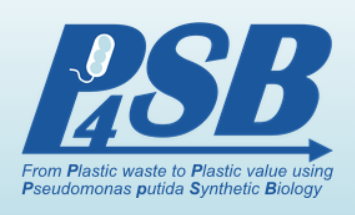- Leipzig University - Germany,
- Agencia Estatal Consejo Superior De Investigaciones Cientificas - Spain,
- University College Dublin, National University of Ireland, Dublin - Ireland,
- Bioplastech LTD - Ireland,
- BACMINE SL - Spain,
- Helmholtz-Centre for Environmental Research (UFZ) - Germany,
- University of Surrey - United Kingdom,
- Centre National de la Recherche Scientifique CNRS - France,
- SOPREMA - France,
- PROTEUS - France
P4SB is about the utilization of the conceptual and material tools of contemporary Synthetic Biology to bring about the sustainable and environmentally friendly bioconversion of oil-based plastic waste into fully biodegradable counterparts by means of deeply engineered, whole-cell bacterial catalysts. These tools will be used to design tailor-made enzymes for the bio-depolymerization of PET (polyethylene terephthalate) and PU (polyurethane), but also for the custom design of a Pseudomonas putida Cell Factory capable of metabolizing the resulting monomers. Pseudomonas putida will undergo deep metabolic surgery to channel these diverse substrates efficiently into the production of polyhydroxyalkanoates (PHA) and derivatives. In addition, synthetic downstream processing modules based on the programmed non-lytic secretion of PHA will facilitate the release and recovery of the bioplastic from the bacterial biomass.
Want to analyze based on this project via our analysis tool? Analyze this project
Knowledge Gaps
Degradation
Environmental effects and ecotoxicity
Commercial-related uncertainties
Environmental fate and behavior of plastic
Toxicokinetics, toxicodynamics and metabolism (ADME)
Publications


